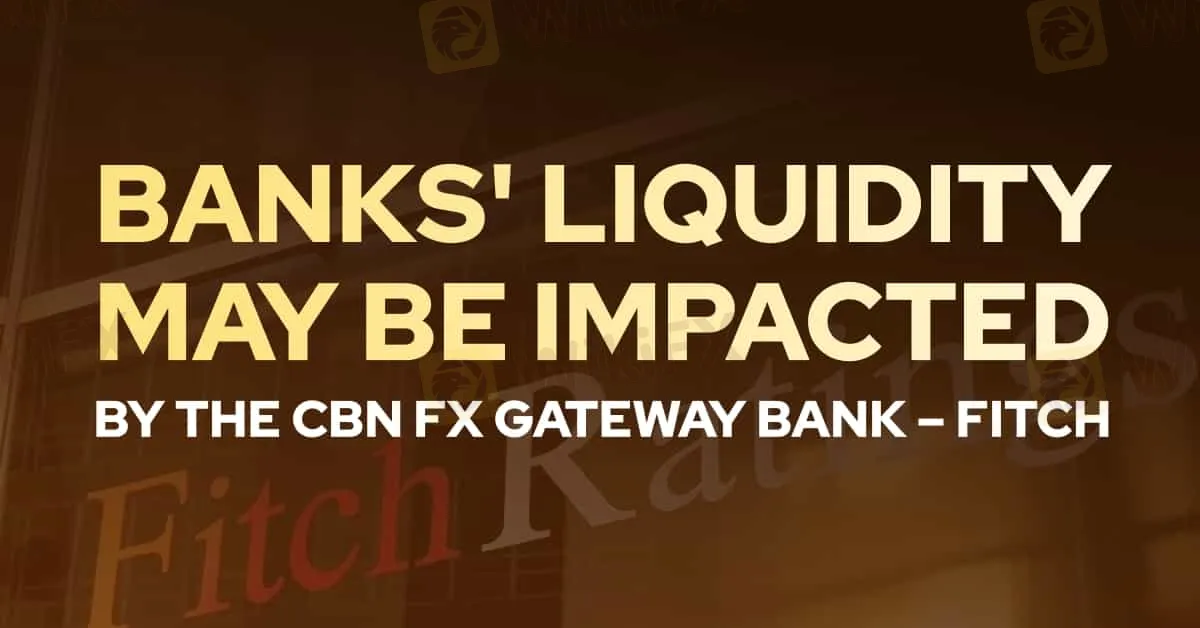简体中文
繁體中文
English
Pусский
日本語
ภาษาไทย
Tiếng Việt
Bahasa Indonesia
Español
हिन्दी
Filippiiniläinen
Français
Deutsch
Português
Türkçe
한국어
العربية
BANKS' LIQUIDITY MAY BE IMPACTED BY THE CBN FX GATEWAY BANK – FITCH
Abstract:According to credit Ratings, the Central Bank of Nigeria's proposed foreign currency gateway bank could negatively impact the liquidity of Nigerian banks.

According to credit Ratings, the Central Bank of Nigeria's proposed foreign currency gateway bank could negatively impact the liquidity of Nigerian banks.
This was revealed in the most recent Fitch Ratings examination of Nigerian banks.
The governor of the apex bank, Dr. Olayemi Cardoso, has announced plans to create a new foreign currency gateway bank in an effort to ease the country's FX issues.
In a televised interview, Cardoso discussed the CBN's plans and said, “Introducing a single FCY gateway bank to centralise all correspondent by two major banks in the corresponding banking space.”
The CBN's medium-term plan, aims to solve Nigeria's ongoing FX issues by centralizing all correspondent banking activities.
In response, Fitch Ratings said, “The Governor of the CBN, Yemi Cardoso, said that there are plans to establish an FC gateway bank with the intention of centralizing correspondent banking activities.” “A recent audit found $2.4 billion of past-due FX forwards invalid.” Fitch believes that the CBN's policies may negatively affect the banking sector's FC liquidity.
Meanwhile, due to the nearly 70% depreciation of the local currency since the end of 2022, Fitch forecasts that bad loans to the banking sector would climb faster than the devaluation. Due to the devaluation, which has increased the already significant ratio of gross loans to core capital and FC-denominated problem loans (Stage 2 and Stage 3 loans, mostly from the oil and gas sector), Fitch predicts that the banking sector's impaired loans (Stage 3 loans) will rise more quickly than it did before.
The CBN circular, which prohibits banks from holding net long foreign currency positions, is expected to result in a further modest depreciation of the naira, according to Fitch.
Not only has the Central Bank of Nigeria issued new circulars, but also depreciated its currency. Following the devaluation, a circular was issued on January 31 which prohibited banks from having net long FC holdings, and set February 1 as the compliance date.
Net long FC positions have mitigated the impact, including the most recent one, on capital ratios because they generate advantages from foreign-exchange revaluation, which buffer the impact of increased FC-denominated assets.
According to the research, banks' capital positions are now more susceptible to Fitch's prediction of a further little depreciation of the naira in net long FC positions, even if total capital adequacy ratios (CAR) regulate minimum norms.
The CBN harmonized the several FX market divisions in June, which caused the naira to come down.
Last year, the local closed for 899/$ at the official market.
The naira saw a second devaluation, according to Fitch, with its value as of February 13 standing at 1,516/$, or around 40% loss.
This exceeded Fitch estimate for 2024. The second in a year—has caused the official exchange rate and the parallel market rate to converge. The continued move away from a long-standing system of beneficial in increasing capital inflows and reducing foreign currency shortages, which have recently impeded economic growth.
However, short-term macroeconomic problems, such as drawing attention to the already inflation (December 2023: 29% year over year), which could impede economic growth and put more pressure on the capital and credit quality of the banking industry.
On Friday, the dollar was sold for 1,537/$ in the official window. It was trading for 1,590/$1 on the parallel market, 1.57 percent less than its closing price of 1,565/$.

Disclaimer:
The views in this article only represent the author's personal views, and do not constitute investment advice on this platform. This platform does not guarantee the accuracy, completeness and timeliness of the information in the article, and will not be liable for any loss caused by the use of or reliance on the information in the article.
Read more

Scam Brokers Exposed! FCA Warns Traders to Stay Safe
If you are into forex trading, you need to protect your money from investment scams. Many scam brokers are active in the market now. The FCA, a reputed financial regulator, has issued a list of unlicensed brokers you need to stay away from.

New to Forex Trading in India? Here's How You Can Start and Maximize
Want to begin your forex trading journey in India? Here's a guide that will help you open and close trading positions effectively, resulting in enhanced returns and minimized risks.

How a TikTok Crypto Scam Cost One Investor RM84,000
A Malaysian woman has lost RM84,000 after falling prey to a cryptocurrency investment scam promoted through the social media platform TikTok. The 52-year-old victim was lured into the scheme by a fraudster posing as an investment advisor, according to police reports filed earlier this week.

xChief: A Closer Look at Its Licenses
In an industry where safety and transparency are essential, the regulatory status of online brokers has never been more important. For traders seeking to protect their capital, ensuring that a platform operates under recognised and stringent oversight can make all the difference. Keep reading to learn more about xChief and its licenses.
WikiFX Broker
Latest News
Alchemy Markets Review 2025: Key Facts and Insights
FXPRIMUS: 5 Things They Don’t Want You to Know
Temasek's portfolio scales new peak even as divestments hit over 2-decade high
5 Serious Warnings About Mirrox! You Can’t Afford to Ignore
Exposing Trade Capital Limited - Siphoning Millions, Restricting Withdrawals, Charging Extra Fees
How Do I Place a Stop-loss Order?
Largest Market Makers
Bitcoin rises to fresh record above $112,000, helped by Nvidia-led tech rally
Stock futures are little changed after S&P 500 posts first winning session in three: Live updates
Nvidia briefly touched $4 trillion market cap for first time
Currency Calculator


